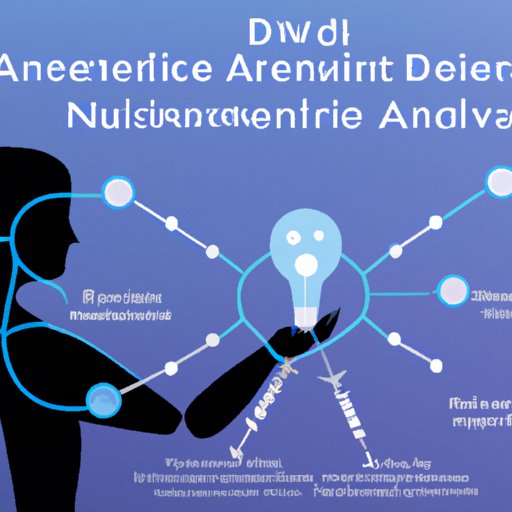Introduction
Artificial intelligence (AI) has become an increasingly important tool in the healthcare industry, as it can be used to improve diagnosis accuracy, streamline administrative tasks, and facilitate personalized patient care. This article will explore how AI is used in healthcare and its potential benefits for patients and providers alike.
AI-Powered Diagnostics and Treatment
AI is being used to analyze patient data in order to diagnose and treat diseases. For example, researchers at Stanford University have developed a deep learning system that can accurately identify skin cancer from images with the same accuracy as dermatologists. Similarly, AI-based systems are being used to diagnose heart disease and other conditions by analyzing patient data such as electrocardiograms.
The use of AI for diagnostics and treatment offers several advantages. According to Dr. Eric Topol, a cardiologist and professor of molecular medicine at The Scripps Research Institute, “AI can bring together pieces of information that would otherwise be impossible to detect.” He notes that AI-powered systems can detect subtle patterns in large datasets that would otherwise be overlooked by human doctors. Furthermore, AI-based systems are faster and more accurate than traditional methods, which can lead to improved patient outcomes.
AI in Medical Imaging
AI is also being used to interpret medical images, such as X-rays and CT scans. AI-based systems can quickly and accurately detect abnormalities in medical images, which can help doctors diagnose diseases more quickly and accurately. For example, AI-powered systems are being used to detect cancers, fractures, and other conditions from medical images.
The use of AI for medical imaging offers several benefits. AI-based systems can quickly and accurately detect abnormalities in medical images, allowing doctors to make diagnoses more quickly and accurately. Additionally, AI-based systems can help reduce the amount of time required to interpret medical images, which can free up resources for other tasks. Finally, AI-powered systems can provide more consistent results than traditional methods, leading to improved patient outcomes.

AI for Drug Discovery and Development
AI is also being used to identify potential drugs and develop new treatments. AI-based systems can quickly scan large datasets of chemical compounds and identify those most likely to be effective in treating certain diseases. For example, scientists at the University of California, San Francisco have developed an AI-based system that can identify potential drugs to treat Alzheimer’s disease.
The use of AI for drug discovery and development offers several advantages. AI-based systems can quickly and accurately identify potential drugs, allowing drug companies to bring new treatments to market more quickly. Additionally, AI-based systems can help reduce the cost of drug development, as they can quickly scan large datasets of chemical compounds and identify those most likely to be effective in treating certain diseases.

AI in Health Data Analysis
AI is also being used to analyze large datasets of health data. AI-based systems can quickly and accurately identify patterns in large datasets of health data, which can help researchers better understand diseases and develop new treatments. For example, researchers at Harvard Medical School have developed an AI-based system that can identify patterns in genomic data to predict the effectiveness of certain treatments.
The use of AI for analyzing health data offers several advantages. AI-based systems can quickly and accurately identify patterns in large datasets of health data, allowing researchers to better understand diseases and develop new treatments. Additionally, AI-based systems can help reduce the cost of research, as they can quickly scan large datasets of health data and identify patterns without requiring manual labor.

Chatbots and Virtual Assistants in Healthcare
AI is also being used to create virtual healthcare assistants. AI-powered chatbots and virtual assistants can offer personalized advice to patients and help them manage their health. For example, virtual assistants such as Google Home and Amazon Alexa can remind patients to take their medications and provide information about their conditions. Additionally, AI-powered chatbots are being used to answer questions from patients and provide general health information.
The use of AI-powered chatbots and virtual assistants in healthcare offers several benefits. AI-powered chatbots and virtual assistants can offer personalized advice to patients, helping them manage their health more effectively. Additionally, AI-powered chatbots can help reduce the burden on healthcare providers, as they can answer basic questions from patients and provide general health information.
AI-Enabled Wearables and Smart Devices
AI is also being used to track health metrics using wearables and smart devices. AI-enabled wearables and smart devices can collect data about a person’s health and alert them if any anomalies are detected. For example, Fitbit devices can track a person’s heart rate and alert them if it is too high or too low. Additionally, AI-enabled wearables and smart devices can offer personalized advice to help people manage their health.
The use of AI-enabled wearables and smart devices offers several benefits. AI-enabled wearables and smart devices can track a person’s health metrics in real time, allowing them to identify any potential problems quickly. Additionally, AI-enabled wearables and smart devices can offer personalized advice to help people manage their health more effectively.
AI in Administrative Tasks and Patient Care
Finally, AI is being used to streamline administrative tasks and improve patient care. AI-based systems can automate administrative tasks such as scheduling appointments and managing medical records. Additionally, AI-based systems are being used to provide personalized patient care, such as providing tailored advice and treatment plans based on a patient’s individual needs.
The use of AI for administrative tasks and patient care offers several benefits. AI-based systems can automate administrative tasks, freeing up resources for other tasks. Additionally, AI-based systems can provide personalized patient care, allowing doctors to spend more time with their patients and providing them with tailored advice and treatment plans.
Conclusion
In conclusion, AI is being used in healthcare to improve diagnosis accuracy, streamline administrative tasks, and facilitate personalized patient care. AI-based systems are being used to analyze patient data, interpret medical images, identify potential drugs, analyze large datasets of health data, create virtual healthcare assistants, track health metrics, and streamline administrative tasks. The use of AI in healthcare offers several advantages, including improved accuracy, speed, and cost-effectiveness.
To further explore how AI is used in healthcare, we recommend consulting experts in the field and keeping up to date with the latest research and developments. Additionally, exploring existing AI-based systems and applications in healthcare can provide insights into how AI can be used to improve diagnosis accuracy, streamline administrative tasks, and facilitate personalized patient care.
(Note: Is this article not meeting your expectations? Do you have knowledge or insights to share? Unlock new opportunities and expand your reach by joining our authors team. Click Registration to join us and share your expertise with our readers.)
